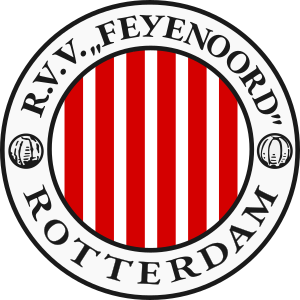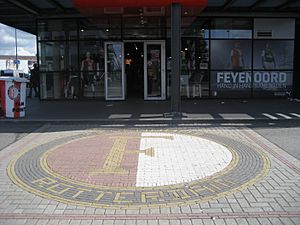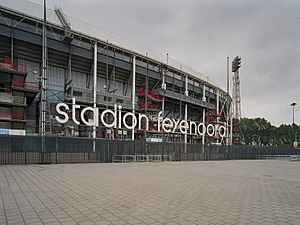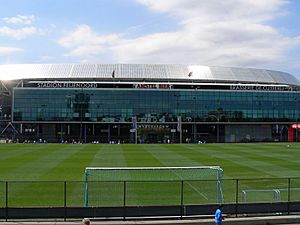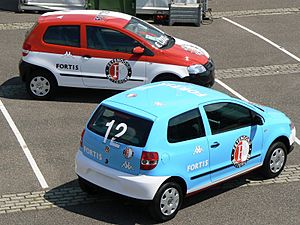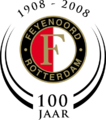Feyenoord facts for kids
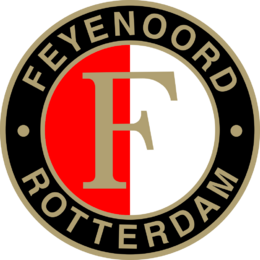 |
|||
| Full name | Feyenoord Rotterdam | ||
|---|---|---|---|
| Nickname(s) | De club aan de Maas (The Club on the Meuse) De Stadionclub (The Stadium Club) De club van het volk (The Club of the People) De Trots van Zuid (The Pride of South) |
||
| Founded | 1908 | ||
| Ground | De Kuip | ||
| Capacity | 51,177 | ||
| Chairman | Toon van Bodegom | ||
| Head coach | Robin van Persie | ||
| League | Eredivisie | ||
| 2022–23 | Eredivisie, 1st of 18 (champions) | ||
|
|||
Feyenoord Rotterdam is a professional football club from Rotterdam, Netherlands. They play in the Eredivisie, which is the top football league in the Netherlands. The club started in 1908 as Wilhelmina and changed names several times before becoming SC Feijenoord in 1912. Since 1937, their home stadium has been De Kuip, also known as The Tub, which is the second-largest stadium in the Netherlands.
Feyenoord is one of the most successful football clubs in Dutch history. They have won 16 national championships, 14 KNVB Cups, and 5 Johan Cruyff Shields. On the international stage, they have won one European Cup, two UEFA Cups, and one Intercontinental Cup. Feyenoord has always played in the top Dutch league since 1921, which is a record for any club in the country.
The club is known for its strong connection with its fans, often called "the people's club." Their most successful time was in the 1960s and 1970s. During this period, players like Coen Moulijn, Willem van Hanegem, and Ove Kindvall helped them win many titles. Feyenoord was the first Dutch club to win both the European Cup and the Intercontinental Cup. More recently, they won the league title in 2017 after an 18-year wait. They also won the UEFA Cup in 2002 in their home stadium, becoming the only Dutch team to win a European trophy this century.
Feyenoord has a big rivalry with Ajax, a team from Amsterdam. This match is called De Klassieker ("The Classic"). The club's anthem is "Hand in Hand." Their home kit is red and white, split down the middle, with black shorts and socks. Feyenoord is also part of a larger sports club that includes amateur football, basketball, futsal, and handball teams.
Contents
- Club History
- Where Feyenoord Plays
- The Stadium: De Kuip
- Feyenoord Supporters
- Rivalries
- Club Achievements
- European Record
- UEFA Club Ranking
- Feyenoord Coaches
- Feyenoord Chairmen
- Feyenoord Media
- Current Squad
- Club Personnel
- Club Partnerships
- Women's Team
- Sponsorships
- Kit Suppliers and Shirt Sponsors
- Images for kids
- See also
Club History
How Feyenoord Started
The club began as Wilhelmina on July 19, 1908. Their first uniforms were red shirts with blue sleeves and white shorts. Over the next few years, the club changed its name several times, becoming Hillesluise Football Club in 1909 and then RVV Celeritas. In 1912, when they joined the national football association, they changed their name to SC Feijenoord, named after the area where the club was founded. They also changed their uniform to the red and white shirts, black shorts, and black socks they still wear today. In 1917, Feijenoord moved to a new ground called Kromme Zandweg and were promoted to the highest level of Dutch football.
Early Wins
Just three years after reaching the top league, Feijenoord won their first national championship in 1924. They continued to be very successful in the late 1920s, winning their division titles multiple times and securing their second national championship in 1928.
Feyenoord won their first Dutch Cup in 1930, beating their local rivals Excelsior in the final. They won the cup again in 1935. As more fans came to watch, the club decided to build a new stadium. They moved to the Feijenoord Stadion, nicknamed "De Kuip" (The Tub), in 1937. They won three more national championships in 1936, 1938, and 1940.
During World War II, Feyenoord played at other stadiums because De Kuip was used by the Nazis. After the war, the club didn't perform as strongly for a while. In 1954, professional football started in the Netherlands, and Feyenoord was one of the first clubs in the new Eredivisie league. They have never been relegated from this top league. A famous early professional match was in 1956 when Feyenoord beat Volewijckers 11–4, with Henk Schouten scoring nine goals! Their rivalry with Ajax also grew strong during this time.
The Golden Era
Feyenoord won their first Eredivisie Championship in 1961. The next season, they played their first European Cup match. In 1962, they also reached the final of the Intertoto Cup 1961–62, but lost to Ajax.
A memorable moment happened on December 12, 1962, when Feyenoord played Vasas SC in the European Cup. Many Feyenoord fans traveled to Antwerp, Belgium, to support their team. Rinus Bennaars scored the winning goal, earning him the nickname "The Hero of Deurne." This event created a lasting friendship between Feyenoord fans and fans of Royal Antwerp.
In 1963, thousands of Feyenoord fans traveled by ship to Lisbon to watch their team play Benfica in the European Cup semi-finals. Even though Feyenoord lost, this trip marked the beginning of the club's most successful period. Feyenoord won the "double" (both the league and the cup) for the first time in 1965 and again in 1969.
As Dutch champions in 1969, Feyenoord entered the 1969–70 European Cup. They beat strong teams like Milan and Legia Warszawa. This led them to their first European final against Celtic in Milan. After a 1–1 draw, Ove Kindvall scored the winning goal in extra time. This made Feyenoord the first Dutch team to win a major European trophy!
As European champions, Feyenoord then played Estudiantes La Plata for the Intercontinental Cup. After a 2–2 draw in Argentina, Feyenoord won 1–0 in Rotterdam, becoming the first Dutch team to win the world club title. In 1971, Feyenoord won their 10th Dutch Championship.
In 1974, the club changed its name from Feijenoord to Feyenoord because people outside the Netherlands found the Dutch "ij" sound hard to pronounce. Under their new name, they won the 1973–74 UEFA Cup, beating Tottenham Hotspur in the final. This made them the first Dutch team to win the UEFA Cup.
Later Years and Challenges
In 1978, the professional and amateur parts of the club became separate teams. Feyenoord won their fifth Dutch Cup in 1980. In 1984, they had another great season, winning the double for the third time. This team included famous players like Johan Cruyff, Ruud Gullit, and Peter Houtman. Cruyff, a legend from Ajax, surprised everyone by joining Feyenoord, which made the rivalry even more intense.
After this success, Feyenoord went through a tough time, even struggling to stay in the top league in 1989–90. They also faced financial problems. However, things started to get better when Wim Jansen became interim manager. They won the KNVB Cup in 1991 and the Dutch Supercup that same year. They won another Dutch Cup in 1992.
In 1993, Feyenoord won their 14th Dutch Championship. They added two more Dutch Cups in 1994 and 1995. In 1999, Feyenoord won their 14th Dutch Championship, leading to huge celebrations in Rotterdam. They also won their second Dutch Super Cup in 1999.
Another European Trophy
Feyenoord played in the UEFA Champions League again in 1999–2000 and 2001–02. In 2001–02, they moved from the Champions League to the 2001–02 UEFA Cup. They beat strong teams like Rangers and PSV. In the semi-finals, they defeated Internazionale, earning a spot in the final against Borussia Dortmund. The final was held at De Kuip, Feyenoord's home stadium, so most fans were cheering for them. Feyenoord won 3–2, with goals from Pierre van Hooijdonk and Jon Dahl Tomasson. This was the last time a Dutch team won a European trophy.
The victory was celebrated with great emotion, especially because it happened just days after the murder of a local political figure, Pim Fortuyn.
Ups and Downs
After the 2002 UEFA Cup win, Feyenoord had a period without major trophies. They finished third in the league in 2002–03 and reached the KNVB Cup final, but lost. In the mid-2000s, the club faced financial difficulties, and their performance on the field suffered. In 2007, they were even banned from European competitions for a season due to fan behavior.
However, Feyenoord started to rebuild. They signed experienced players like Giovanni van Bronckhorst and Roy Makaay. In 2008, they won the KNVB Cup, their first trophy in six years, celebrating their 100th anniversary.
Financial Recovery and Youth Focus
In the early 2010s, Feyenoord continued to face financial challenges. In 2010, they suffered a very heavy 10–0 loss to PSV. However, the club worked hard to improve its finances and focus on developing young players from its own academy.
In 2011, former player Ronald Koeman became the head coach. Under his leadership, Feyenoord started to perform much better, finishing second in the league in 2011–12. The club also improved its financial situation, moving out of the "financial danger zone" by 2012. They continued to rely on young talent and smart transfers.
In the 2013–14 season, Feyenoord had a slow start but recovered to finish second in the league. Ronald Koeman left the club in 2014.
Return to Winning Ways
In the summer of 2014, Feyenoord lost several key players. However, they brought in new players and welcomed back club legend Dirk Kuyt in 2015. The team started the 2015–16 season well and, after eight years without a trophy, won their 12th KNVB Cup on April 24, 2016.
The 2016–17 season was fantastic for Feyenoord. They won their first nine league matches and beat Manchester United in the Europa League. They stayed at the top of the league table for the entire season. On the final day, May 14, 2017, Feyenoord won 3–1 against Heracles, with captain Dirk Kuyt scoring all three goals. This secured their 15th Dutch Championship, their first in 18 years, in a truly memorable way for Kuyt, who then retired.
As champions, Feyenoord played in the 2017–18 UEFA Champions League group stage. They also won the Dutch Cup in 2018, beating AZ 3–0 in the final. In the 2018–19 Eredivisie season, Feyenoord finished third and had a historic 6–2 win against Ajax at home. After the season, coach Giovanni van Bronckhorst left, and star player Robin van Persie retired.
New Challenges and European Final
The 2019–20 season started with mixed results. After a tough loss to Ajax, coach Jaap Stam resigned, and Dick Advocaat took over. Under Advocaat, Feyenoord improved greatly, climbing to third place before the league was stopped due to the COVID-19 pandemic. They also qualified for the Dutch Cup final, which was not played.
In the 2020–21 season, Feyenoord had a decent start but struggled in the second half, finishing fifth. Arne Slot was announced as the new head coach.
Under Arne Slot, Feyenoord had a very exciting 2021–22 season. They reached the final of the first-ever UEFA Europa Conference League, beating teams like Partizan Belgrado and Olympique Marseille. However, they lost 1–0 in the final to Italian club Roma. In the league, they finished third.
Despite losing many players after their European final, Feyenoord stayed strong in the 2022-23 Eredivisie Season. They had a fantastic 13-game winning streak, including a crucial away win against Ajax, their first since 2005. Feyenoord secured their 16th championship win two games before the end of the season, beating Go Ahead Eagles 3–0. They were praised for their energetic and attacking style of play. In the 2022–23 UEFA Europa League, they reached the quarter-finals but were again eliminated by AS Roma.
The 2023-24 Eredivisie season saw Feyenoord start slowly, drawing their first two league games and losing the Johan Cruijff Schaal to PSV. However, they then won seven games in a row, including a big 4–0 away win against Ajax. They finished second in the league, behind PSV, who had an incredible season. In the 2023–24 UEFA Champions League, Feyenoord showed good form at home but struggled away, finishing third in their group. They then moved to the 2023–24 UEFA Europa League preliminary round, where they were eliminated by AS Roma for the third year in a row after a penalty shootout.
Feyenoord had a very strong second half of the 2023–24 season, remaining unbeaten in all competitive matches after the winter break. They won the KNVB Cup on April 21, 2024, beating NEC Nijmegen 1–0, which was their 14th cup victory. They also secured second place in the league, qualifying for the 2024–25 UEFA Champions League group stage. After the season, Arne Slot left to become head coach of Liverpool.
Brian Priske from Denmark was appointed as the new head coach. He started by winning the Johan Cruijff Schaal against PSV in a thrilling penalty shootout. However, after mixed results and a series of injuries, Priske was replaced by youth academy coach Pascal Bosschaart on an interim basis. In early 2025, Robin van Persie, a former player and current head coach of SC Heerenveen, was announced as the permanent head coach. Under Bosschaart, Feyenoord eliminated AC Milan in the Champions League preliminary rounds. With Van Persie as the new head coach, Feyenoord was eliminated by Internazionale in the Champions League. In the Eredivisie, Feyenoord recovered and secured third place, qualifying for the 2025-26 UEFA Champions League qualifying rounds.
Where Feyenoord Plays
Feyenoord is based in the Feijenoord district in the southern part of Rotterdam. The club is named after this area. The name was changed in 1974 to Feyenoord because people from other countries found the Dutch "ij" sound difficult to say. Rotterdam has two other professional football clubs: Sparta and Excelsior. Feyenoord and Sparta currently play in the Eredivisie.
The Stadium: De Kuip
About De Kuip
Feyenoord's home stadium is the Feijenoord Stadion, located in the IJsselmonde district of Rotterdam. It's often called De Kuip, which means The Tub in Dutch. Built in 1937, it's a very important stadium in Europe. It has 51,117 seats and has hosted many major European finals, including the 2002 UEFA Cup Final which Feyenoord won. Former player Mike Obiku once said, "Every time you enter the pitch, you're stepping into a lion's den," describing the intense atmosphere. The stadium is not owned by the club itself but by a separate organization.
The stadium opened on March 27, 1937. During World War II, it was one of the few buildings not bombed, but it was occupied by the Nazis. After the war, De Kuip became popular again. In 1949, a record 64,368 fans attended a match there. Besides football, the stadium also hosted boxing and motorcycle races. In 1957, the stadium's floodlights were used for the first time during an evening match against Bolton Wanderers. Fans were asked to light their matchsticks when the lights came on, creating a special moment.
New Stadium Plans
For many years, there have been discussions about building a new stadium for Feyenoord. Plans for a very large stadium (up to 100,000 seats) were discussed in the 2000s, but these were put on hold due to financial difficulties.
Later, in 2012, Feyenoord confirmed plans for a new 63,000-seat stadium. However, many fans preferred renovating the current De Kuip, with one group proposing to add a third tier to increase capacity to 68,000. In 2016, Feyenoord announced plans for "Feyenoord City," a new stadium project with around 65,000 seats. However, in May 2022, it was announced that Feyenoord City was not possible due to financial issues, and a major renovation of the current stadium was also put on hold for now.
Stadium Songs
Official Feyenoord Anthem
Since 1961, Feyenoord's official anthem is "Hand in Hand." The tune is old, from the 19th century. In 1961, Jaap Valkhoff wrote the lyrics, and it quickly became popular with Feyenoord fans. You can hear this song wherever Feyenoord plays.
Other Songs
When Feyenoord scores a goal at home, the song "I Will Survive" by the Hermes House Band is played. Feyenoord supporters have many other songs and chants. Some important ones include "Wie heeft er weer een goal gescoord, Feijenoord, Feijenoord" by Tom Manders, "Mijn Feyenoord" by Lee Towers, and "Feyenoord, wat gaan we doen vandaag?" by Cock van der Palm. In 2002, a song called "Put your hands up for Pi-Air" was popular, honoring player Pierre van Hooijdonk.
Feyenoord Supporters
Feyenoord's fans are known for being incredibly loyal, supporting their team through good times and bad. They are nicknamed Het Legioen, which means The Legion in Dutch. They can be found all over the Netherlands and even in other countries. The number 12 jersey is never given to a player; it's reserved for Het Legioen, showing how important the fans are to the club.
Popularity
Feyenoord is a very popular club in the Netherlands. Thousands of fans attend the team's first training session of the season. In 1963, about 3,000 fans traveled by ship to Lisbon to watch Feyenoord play in the European Cup. When Feyenoord plays abroad in European competitions, thousands of fans often travel to support them. About 40,000 fans usually attend home matches, and big games against Ajax, PSV, and European opponents are almost always sold out. In 1999, about 250,000 fans celebrated Feyenoord's Dutch championship in the center of Rotterdam.
Supporters' Groups
Feyenoord has an official fan club called the Feyenoord Supportersvereniging (FSV), which has many members. The FSV helps connect the club and its fans, organizes travel to away games, and arranges fan events. Children aged 0 to 12 can join the Kameraadjes group, which means "little comrades."
In 1998, fans started creating large flags and displays to improve the atmosphere in the stadium during important matches. This led to the creation of the TIFO team Feyenoord Rotterdam in 2000, which organizes bigger activities like smoke displays. Feyenoord's TIFO team even won an international award for their efforts.
Youth Project
Feyenoord's Youth Project focuses on children aged 6 to 12 who play football at schools and amateur teams. The project aims to teach kids about the importance of sports and sportsmanship. Feyenoord invites children to De Kuip to experience the excitement and emotions of a match. The project also has an educational side, providing schools with teaching materials for kids to complete when they visit the stadium on a match day. Groups that show the most original support or predict the score correctly can win prizes.
Opening Day
A few weeks before the new season starts, Feyenoord holds an "Opening Day" where the stadium opens its doors for free to all fans. There are many activities around the stadium, especially for kids, and promotional events. Fans can take stadium tours and even walk on the pitch. Inside the stadium, there are performances by artists. The highlight is when the new team squad is presented to the fans. New players are often flown into the stadium by helicopter, with a full stadium cheering for them. After the presentation, all players are available for autograph sessions. Feyenoord's Opening Day attracts tens of thousands of fans from all over the Netherlands, making it a unique event.
Rivalries
The Classic (De Klassieker)
Ajax from Amsterdam is Feyenoord's biggest rival. Matches between these two clubs are called De Klassieker (The Classic). This rivalry is not just about football; it's also a clash between the two largest cities in the Netherlands, Amsterdam and Rotterdam, which have very different cultures. These matches are always considered the most important of the season. In the past, there have been serious incidents between supporters of both clubs, showing the intensity of this rivalry.
Rotterdam Derby
Rotterdam has the most professional football teams in the Netherlands: Feyenoord, Sparta, and Excelsior. There is a rivalry between these teams, especially between Feyenoord and Sparta. This rivalry began in the early 1900s, when Sparta was seen as a club for the wealthy, and Feyenoord was seen as the club for working-class people. Some Sparta fans have even refused to enter De Kuip stadium, even for important matches.
Feyenoord also has a rivalry with Tottenham Hotspur from England, due to past clashes between their fans.
Club Achievements
| Type | Competition | Titles | Seasons |
|---|---|---|---|
| Domestic | Eredivisie | 16 | 1923–24, 1927–28, 1935–36, 1937–38, 1939–40, 1960–61, 1961–62, 1964–65, 1968–69, 1970–71 |
| KNVB Cup | 14 | 1929–30, 1934–35, 1964–65, 1968–69, 1979–80, 1983–84, 1990–91, 1991–92, 1993–94, 1994–95, 2007–08, 2015–16, 2017–18, 2023–24 | |
| Johan Cruyff Shield | 5 | 1991, 1999, 2017, 2018, 2024 | |
| Continental | UEFA Champions League | 1 | 1969–70 |
| UEFA Europa League | 2 | 1973–74, 2001–02 | |
| Worldwide | Intercontinental Cup | 1 | 1970 |
European Record
| Competition | Pld | W | D | L | GF | GA | GD | Win% |
|---|---|---|---|---|---|---|---|---|
| European Cup/UEFA Champions League | 107 | 41 | 25 | 41 | 177 | 152 | +25 | 38.32 |
| UEFA Cup/UEFA Europa League | 151 | 61 | 38 | 52 | 232 | 190 | +42 | 40.40 |
| UEFA Europa Conference League | 19 | 12 | 5 | 2 | 43 | 21 | +22 | 63.16 |
| European Cup Winners' Cup/UEFA Cup Winners' Cup | 36 | 18 | 10 | 8 | 57 | 34 | +23 | 50.00 |
| UEFA Super Cup | 1 | 0 | 0 | 1 | 1 | 3 | −2 | 0.00 |
| Inter-Cities Fairs Cup | 2 | 1 | 0 | 1 | 2 | 4 | −2 | 50.00 |
| Total | 312 | 132 | 77 | 103 | 509 | 399 | +110 | 42.31 |
UEFA Club Ranking
UEFA club coefficient: 71,000 (26th) (as per 12 May 2025)
| Rank | Nation | Team | Points |
|---|---|---|---|
| 23 | Eintracht Frankfurt | 74,000 | |
| 24 | Club Brugge KV | 71,750 | |
| 25 | Rangers F.C. | 71,250 | |
| 26 | Feyenoord | 71,000 | |
| 27 | PSV Eindhoven | 69,250 | |
| 28 | West Ham United F.C. | 69,000 | |
| 29 | Tottenham Hotspur F.C. | 68,250 |
Feyenoord Coaches
Feyenoord has had coaches from many different countries. In the early days, most coaches were English. Richard Dombi is known as the first very successful coach. Feyenoord's international trophies were won under coaches Ernst Happel, Wiel Coerver, and Bert van Marwijk.
|
|
Feyenoord Chairmen
Most of Feyenoord's chairmen have been Dutch. Cor Kieboom was the longest-serving chairman, holding the position for 28 years.
Feyenoord Media
Since 2000, Feyenoord has had its own TV show on SBS6, featuring interviews and documentaries about the team. They also launched Feyenoord TV on their website in 2006–07, providing daily news and reports.
In 1993, Feyenoord started its own newspaper, the Feyenoord Krant, which is published every two weeks. It includes news, interviews, and columns. Feyenoord launched its official website in 2001, available in Dutch and English, and sometimes other languages depending on popular players. They also have official YouTube pages. Fans can get news and statistics on their phones or by email. For every home match, a program magazine is created, and children in the Kameraadjes group receive a special magazine.
In January 2024, Feyenoord launched its own streaming service called Feyenoord One. This service offers exclusive documentaries, video series, replays of old matches, and live streams of youth academy games.
Current Squad
|
|
Out on Loan
|
Reserve Squad
|
|
Retired Numbers
Club Personnel
Backroom Staff
| Position | |
|---|---|
| Head coach | |
| Assistant coach | |
| Video Analyst & Adviser Technical Staff | |
| Head of Methodology | |
| Goalkeeping coach | |
| Head of medical staff | |
| Club doctor | |
| Physical trainer | |
| Recovery and physical coach | |
| Physio and manual therapists | |
| Podiatrist and manual therapist | |
| Club doctor | |
| Orthopedic surgeon | |
| Performance analyst | |
| Team manager | |
| Equipment manager | |
| Academy director | |
| Academy manager |
Club Partnerships
SC Feyenoord
SC Feyenoord is the amateur and youth side of Feyenoord. They play at Varkenoord, right behind De Kuip. Many players from Sportclub Feyenoord have gone on to have successful careers, including Puck van Heel, Wim Jansen, and Giovanni van Bronckhorst.
Partnerships with Other Clubs
Feyenoord has partnerships with other clubs to help young players develop. One strong partnership is with Excelsior, where young Feyenoord players can play regularly to gain experience. Famous players like Thomas Buffel and Salomon Kalou benefited from this arrangement.
Feyenoord also has a partnership with Újpest FC in Hungary and the Feyenoord Academy in Ghana. The academy in Ghana helps young African footballers develop their skills and provides them with an education, funded by Feyenoord.
In 2019, Feyenoord started a partnership with FC Dordrecht to loan out players who are not yet ready for the first team.
Women's Team
On March 31, 2021, Feyenoord announced that they would be starting a women's team. This team joined the women's Eredivisie for the 2021–22 season.
Women's Team Staff
| Position | |
|---|---|
| Head coach | |
| Assistant coaches | |
| Goalkeeping coach | |
| Team manager | |
| Physiotherapist |
Sponsorships
Since 1981–82, Dutch football teams have been allowed to have sponsors' names on their shirts. Feyenoord's first main sponsor was the Dutch Yellow Pages. Later, Opel became a sponsor.
From 1991 to 2004, Stad Rotterdam Verzekeringen was Feyenoord's main sponsor. This company was later taken over by Fortis, which continued the sponsorship until 2009. When Fortis faced financial problems, the insurance part of the company became ASR, which continued to sponsor Feyenoord until 2013. After that, Opel became the club's main sponsor again until 2017.
Since 2017, Feyenoord has had different main sponsors, including Greenchoice and Droomparken. Currently, MediaMarkt is the main shirt sponsor, with Toto as a sleeve sponsor and Prijsvrij Vakanties as a back sponsor.
Kit Suppliers and Shirt Sponsors
| Period | Kit manufacturer | Kit sponsor |
|---|---|---|
| 1981–82 | Adidas | Gouden Gids |
| 1982−84 | Puma | |
| 1984–87 | Opel | |
| 1987–89 | Hummel | |
| 1989−90 | HCS | |
| 1990−91 | Adidas | |
| 1991−2000 | Stad Rotterdam Verzekeringen | |
| 2000−04 | Kappa | |
| 2004−09 | Fortis | |
| 2009−13 | Puma | ASR Nederland |
| 2013 | Diergaarde Blijdorp | |
| 2013–14 | Opel | |
| 2014–17 | Adidas | |
| 2017–19 | Greenchoice | |
| 2019 | Droomparken | |
| 2020–2021 | Droomparken (Eredivisie) EuroParcs (KNVB Cup and Europa League) Toto (Sleeve sponsor) |
|
| 2021–2023 | EuroParcs Toto (Sleeve sponsor) |
|
| 2023– | Castore | MediaMarkt Toto (Sleeve sponsor) Prijsvrij Vakanties (Backsponsor) |
Images for kids
See also
 In Spanish: Feyenoord para niños
In Spanish: Feyenoord para niños
 | Claudette Colvin |
 | Myrlie Evers-Williams |
 | Alberta Odell Jones |


